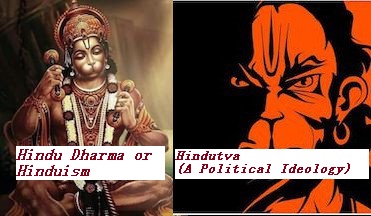Hinduism and Hindutva are two concepts that often get linked together, but they represent different ideas with distinct meanings.
Hinduism is an ancient and diverse religious and cultural tradition that has been practiced in India for thousands of years. It's a way of life with a wide range of beliefs, rituals, and philosophies. Hinduism has no single founder and encompasses various traditions, scriptures, gods, and practices. It promotes concepts such as karma (the law of cause and effect), dharma (duty/righteousness), reincarnation, and the pursuit of spiritual liberation.
On the other hand, Hindutva is a new political and cultural ideology that emerged in the early 20th century. It was coined by Vinayak Damodar Savarkar (an Atheist/Nastik) and later popularized by organizations like the Rashtriya Swayamsevak Sangh (RSS). Hindutva seeks to establish a Hindu identity and assert the cultural and nationalistic aspects of Hindu heritage. It emphasizes the idea that India should be a homeland for Hindus and often advocates for Hindu cultural dominance in the social and political sphere. It has little to do with Hindu religion, which is the oldest religion in the world.
The main differences between Hinduism and Hindutva can be summarized as follows:
1. **Religion vs. Ideology:** Hinduism is a religion and a way of life encompassing diverse beliefs and practices. It is spiritual and focused on individual faith, rituals, and personal experiences. Hindutva, on the other hand, is a political and cultural ideology that aims to assert a specific Hindu identity and cultural dominance.
2. **Inclusivity vs. Exclusivity:** Hinduism is known for its inclusivity, tolerance, and acceptance of diverse beliefs and practices. It accommodates various sects, philosophies, and gods. Hindutva, however, tends to advocate for a more exclusive understanding of Indian identity, with a focus on Hindu culture as central to national identity.
3. **Spiritual vs. Political:** Hinduism emphasizes spiritual pursuits, personal salvation, and moral values such as non-violence and compassion. Hindutva, while drawing inspiration from Hindu cultural elements, is primarily concerned with political and social goals, seeking to unite Hindus under a common cultural and nationalistic identity.
4. **Ancient Tradition vs. Modern Ideology:** Hinduism has ancient roots, evolving over thousands of years, and is deeply embedded in Indian history and culture. Hindutva, comparatively, is a more modern ideology that emerged in the 20th century in response to social and political changes.
The ideology of Hindutva has faced criticism and raised concerns regarding various negative aspects. Some of the criticisms and negative aspects associated with Hindutva include:
1. **Exclusivism and Communalism:** Hindutva ideology has been criticized for its exclusivist tendencies that prioritize and promote a particular interpretation of Hindu identity, sometimes at the expense of other religious or cultural communities. This has led to concerns about communal tensions and conflicts with religious minorities in India.
2. **Marginalization of Minorities:** Critics argue that Hindutva, in its pursuit of establishing a Hindu cultural dominance, may lead to marginalization or discrimination against religious minorities, including Muslims, Christians, Sikhs, and others. There have been instances of violence and social tensions targeting minority communities, leading to concerns about religious freedom and human rights violations.
3. **Nationalism and Patriotism:** While proponents of Hindutva advocate for a strong sense of nationalism and patriotism, critics argue that this form of nationalism might exclude those who don't align with its specific cultural and ideological frameworks, potentially undermining the diversity that has historically characterized India.
4. **Erosion of Secular Values:** Hindutva ideology has been associated with challenges to India's secular fabric, which has been a fundamental principle of the Indian Constitution. Critics argue that the promotion of a particular religious identity within politics and public life contradicts the secular principles enshrined in the Constitution and threatens the pluralistic nature of Indian society.
5. **Politicization of Religion:** Critics highlight concerns about the politicization of religion under the banner of Hindutva, which could blur the lines between religious and political spheres. This can potentially impact governance, public policy, and social cohesion, leading to divisions along religious lines and undermining the idea of a secular state.
6. **Interpretation of History and Cultural Heritage:** Hindutva proponents have attempted to reinterpret history and cultural heritage in a way that aligns with their ideology. Critics argue that this selective interpretation can distort historical facts and cultural narratives, leading to a biased portrayal of India's past and heritage.
Hindutva ideology is a tool of political organisations like RSS and is used to promote political narratives. A devout Hindu of the oldest religion in the world calls his religion Hinduism or Sanatana Dharma.


